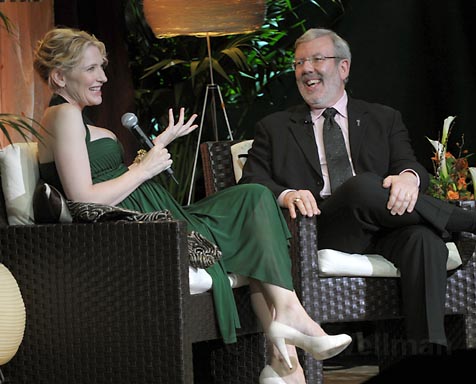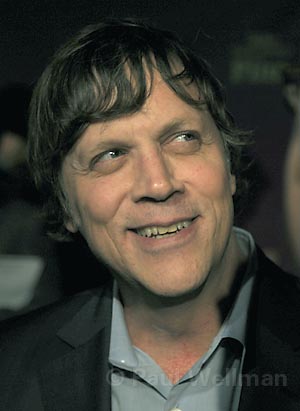Woodard’s Wraps: Film Festival, Day Three
Shows, no-shows, and a Modern Master, Cate Blanchett

WRITERS STRICKEN: What if they gave a screenwriter’s panel and nobody came? Said panel, long one of the most popular non-screening events at the Santa Barbara International Film Festival, was canceled on short notice, ostensibly because of a peculiar rash of the “flu” in the writer community. But a familiar two-word phrase popped into everybody’s brain upon hearing the news: “writer’s strike.”
Yes, the strike has hit home, not only for jones-ing SNL fans, but now SBIFF panel fans. Meanwhile, the movie industry warlords are dragging their feet and pinching royalty points for minions in the machinery, those who merely tap on keyboards for a living. Maybe next year’s Fest will include a well-placed doc on the strike as cautionary tale and history lesson.
Things have been going right with a high batting average at the Festival so far, enough so that little wrinkles get extra attention. Take, for instance, the cancellation of the anticipated Takeshi Kitano film Glory to the Filmmaker which arrived in town with Italian subtitles. The Italian-speaking Japanese art film demographic in Santa Barbara didn’t quite warrant a screening.

From the very right stuff dept., 2008’s “Modern Master” award went to someone who could be deemed an honest-to-goodness Modern Master, Cate Blanchett, toasted at Saturday’s Arlington Theatre evening with less glitter and hoopla than the Will Smith evening last year, but with vastly more credibility. Will Smith seems like a nice guy, if not much of an actor. Blanchett seems like a nice gal, and an astonishing actress, even when playing one side of Bob Dylan, in Todd Haynes’s recent game experimental quasi-biopic I’m Not There.
At the Arlington, Blanchett arrived in a fetching green dress and with baby number three in tow. It makes sense that she would play Kate Hepburn in The Aviator, and with such aplomb (as usual): Blanchett has a classic, dignified beauty seemingly connected to her mind and soul, not a cheap surface beauty. Even so, at the Arlington, she talked about viewing her work less as self-expression than as the art of getting duly lost in a character or dramatic project.
“I hear some actors say they see it as personal expression,” she said. “I don’t understand what all of that means. I find that utterly terrifying. I don’t know who I am.”
A quirkier clip on this tribute night was her doppelganger turn in Jim Jarmusch’s quirky jewel Coffee and Cigarettes, a skit which finds her playing both herself as an actress in a swanky hotel and her street-ish Aussie cousin. When Jarmusch offered her the job, she said and mentioned she would be playing dual characters, she immediately said yes: “I love doubling on stage, but it’s so rarely done on film.”
Being a mother, with another on the way, has been a grounding rather than a complicating factor. “In a way, for me, having children has made me much more focused and less neurotic as an actor. You just don’t have the time to do what I previously thought was preparation but is just anxiety. It did take that neurosis away for me.”
FILM NOTES FROM ALL OVER: This year’s international film fare continues to impress, day by day. Germany and Austria have a bold presence in the fest, including the Austrian Oscar submission film, director Stefan Ruzowitzky’s The Counterfeiters, a fascinating piece about the elaborate and potentially destructive counterfeiting operation at the Sachsenhausen concentration camp, just outside of Berlin. As with last year’s German film The Lives of Others-which went on to win the foreign film Oscar-The Counterfeiters deals with a hot historical subject in a vivid and artful, but also perfectly accessible and fluidly narrative way.
Another German film, writer-director Theo Krieger’s Beautiful Bitch, has been one of the surprise hits of the Festival’s first days, requiring fast footwork and extra screenings to accommodate the demand. Krieger has made an engaging study of the social issue of hapless Romanian orphans forced into pickpocketing rings, in this case, in Dusseldorf. Mean street-level realities of these children, particularly Bica-nicknamed “Bitch,” and played with a bracing coolness by first-timer Katharina Derr-is juxtaposed against cushier adolescent life. If it veers away from early realism to the neighborhood of glib sentimentality at times, the film is still a captivating ride, with points to make about the cruelty of fates befalling children and the exploitative systems they fall into.
Krieger was in town to speak after the film, and he expressed his pleasant surprise at the warm reception, and also introduced a Santa Barbara-based friend, Jesse Ballard, who wrote a song for the film. He explained that he was a teacher in his “former life” and had been apprised of the Romanian pickpocket situation through newspaper articles. He also defended the happy ending to his patently grim scenario, noting that “nearly everybody has some kind of chance to change things in their life for the better.”
Social issues wrapped up in solid and sometimes wrenching filmic storytelling appears to a specialty for Chinese director Li Yang, whose expose of dangerous mining condition in China Blind Shaft was one of the stronger films of the 2006 SBIFF. Now comes Blind Mountain, a nightmarish tale in an idyllic mountain village in Northern China circa the early ’90s, where a woman has been kidnapped and sold into a marriage, with little hope for escape. The larger subject is the human traffic trade, still an issue in China and beyond. Chinese censors saw fit to make liberal cuts in the version suitable for the Chinese, but this was the uncut “international version-” perhaps a bit long-ish (or was that just the inherent pain of watching our heroine’s prolonged suffering and one too many near getaways?). Whatever the case, this is one of many films this year that sticks in the brain, in a haunting way. As a friend said at film’s end, with a wry grin, “sleep well.”



